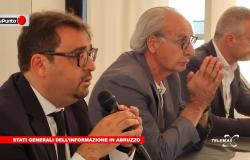Three hundred and nine Venetian municipalities are called to choose their mayor and municipal council on 8 and 9 June. If we consider that there are 563 municipalities in total, it is easy to understand how impactful these administrative elections are, involving more than half of the tricolor bands and over a third of the residents of our region.
There is only one capital, Rovigo: it is the most significant challenge on a political level, the centre-left split shortly before the vote, the resigning mayor is running again with the left and civics, the rest of his former coalition supports another candidate, while the centre-right has united to regain a city he administered until five years ago.
Then there are 23 important municipalities in the territories, those that have more than 15 thousand inhabitants and become interesting locations: Cadoneghe, Monselice, Rubano and Selvazzano Dentro (in the province of Padua); Mogliano, Paese, Preganziol and Vittorio Veneto (Treviso); Noale, Portogruaro, Scorzè and Spinea (Venice); Legnago, Negrar di Valpolicella, Pescantina, San Bonifacio and Valeggio sul Mincio (Verona); Arzignano, Bassano del Grappa, Cassola, Montecchio Maggiore, Schio and Valdagno (Vicenza). In many cases, the center-right on one side and the center-left on the other are playing it out, but there are also internal divisions with the usually allied parties who instead find themselves adversaries on the ballot paper. And it becomes a challenge within the challenge.
When you vote
Voting takes place on Saturday 8th from 3pm to 11pm and on Sunday 9th from 7am to 11pm. In order to vote it is necessary to show up at the polling stations with your identity document and electoral card (which can be requested in case of loss or exhaustion of space for stamps). to the electoral offices of the Municipality). Voting for the first time is scheduled for Saturday: there is no voting on Monday, even if the round extends over two days. The schools that become polling stations will be closed from June 7th to allow for set-up.
The counting of the ballots for the local elections will take place after the counting for the European elections: this means that the information on the new mayors and municipal councils, in the less populous territories, will arrive no earlier than late morning.
How to vote in the municipalities
The 285 municipalities with less than 15 thousand residents vote in a single round. The candidate who achieves the highest percentage of votes is elected.
Municipalities with more than 15 thousand residents vote with a double-round system. If none of the mayoral candidates reaches 50% of the votes, the two candidates who obtained the highest percentage return to compete in the run-off two weeks later (23 and 24 June).
In the event that there is only one mayoral candidate, 40% of the voters registered in the electoral lists of that Municipality must go to vote, otherwise the municipality is expected to be managed under extraordinary administration by a commissioner indicated by the Prefecture; valid votes must be at least 50%.
Votes and preferences
The voter’s vote can be articulated in various ways. You can place an X on the name of the chosen mayoral candidate, giving your vote only to the mayoral candidate; you can put the You can also vote separately: put the X on the name of a mayoral candidate and on an unrelated list.
The voter has the opportunity to express one or two preferences for candidate municipal councilors. It is essential that the councilors are from the same list and that their names are written next to the list symbol. For the double preference to be valid, candidates must be of different genders. It therefore applies if they are a man and a woman, not if they are two men or two women. If they are of the same gender, preference goes only to the first name indicated, not to the second.
The news
This year for the first time, thanks to a recent reform affecting local authorities, the outgoing mayors of municipalities with between 5 and 15 thousand inhabitants can apply to seek the third consecutive mandate, while the mayors of municipalities with up to 5 thousand residents, who before they had three mandates, now they have potentially “unlimited” ones. For the first time, three new municipalities created from mergers choose their mayor: Santa Caterina d’Este (Padua), Setteville (Belluno) and Sovizzo (Vicenza).





